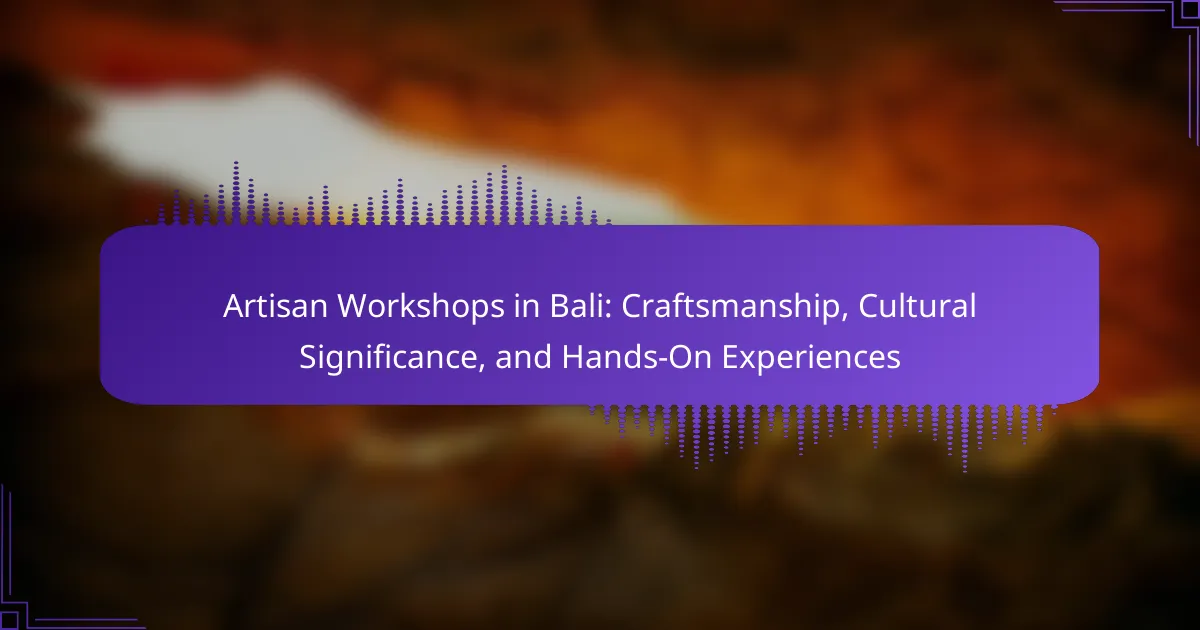Artisan workshops in Bali provide unique hands-on experiences that immerse visitors in traditional craftsmanship. Participants can learn skills such as wood carving, batik painting, and pottery while gaining insights into Balinese cultural significance. These workshops preserve heritage and connect generations through shared knowledge. Visitors leave with authentic handmade souvenirs, enhancing their appreciation for Bali’s rich artistic traditions.
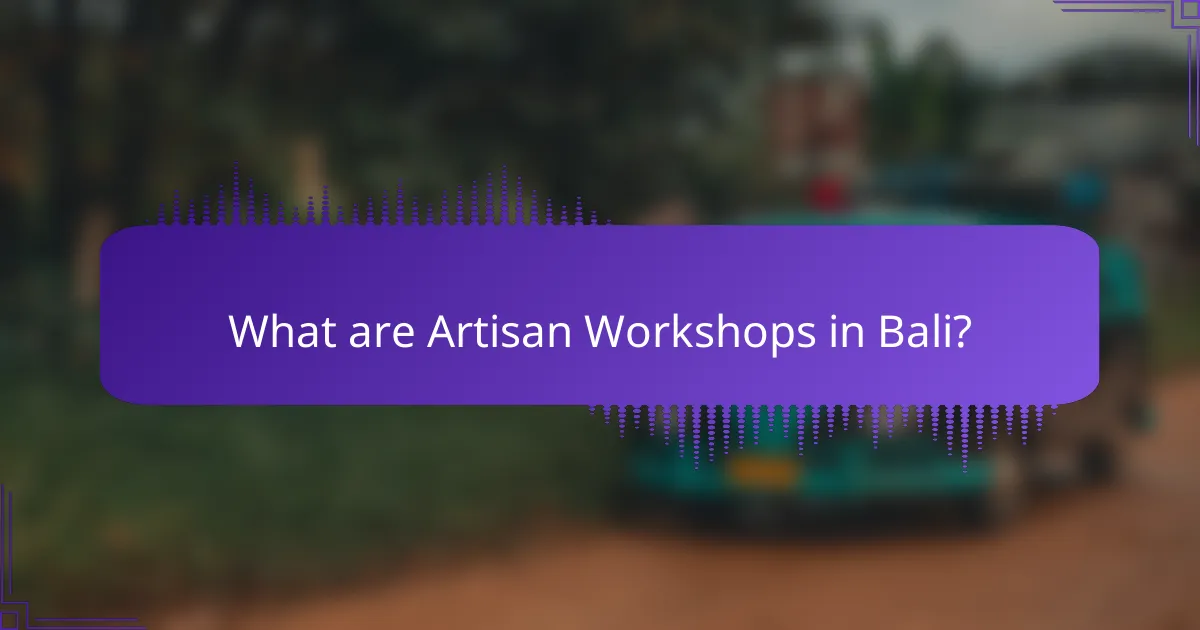
What are Artisan Workshops in Bali?
Artisan workshops in Bali offer immersive experiences that showcase traditional craftsmanship and cultural heritage. These workshops allow visitors to engage hands-on with local artisans, learning skills such as wood carving, batik painting, and pottery. The significance of these workshops extends beyond skill acquisition; they foster appreciation for Balinese culture and sustainable practices. Participants often leave with unique handmade souvenirs, enhancing their connection to the island’s rich artistic traditions.
How do Artisan Workshops reflect Balinese culture?
Artisan workshops in Bali vividly reflect Balinese culture through traditional craftsmanship and communal values. These workshops preserve age-old techniques, showcasing skills passed down through generations. The artisans often use local materials, emphasizing sustainability and connection to the land. Hands-on experiences in these workshops allow visitors to engage directly with the culture, fostering appreciation and understanding. This immersive interaction highlights the unique attributes of Balinese artistry, such as intricate wood carving and vibrant textile weaving, which are integral to cultural identity.
What types of crafts are commonly produced in these workshops?
Artisan workshops in Bali commonly produce a variety of crafts, including textiles, wood carvings, pottery, jewelry, and traditional masks. These crafts reflect the island’s rich cultural heritage and artistic skills. Each craft showcases unique attributes, such as intricate designs in textiles and detailed craftsmanship in wood carvings. The workshops also offer hands-on experiences, allowing visitors to engage directly with artisans and learn traditional techniques.
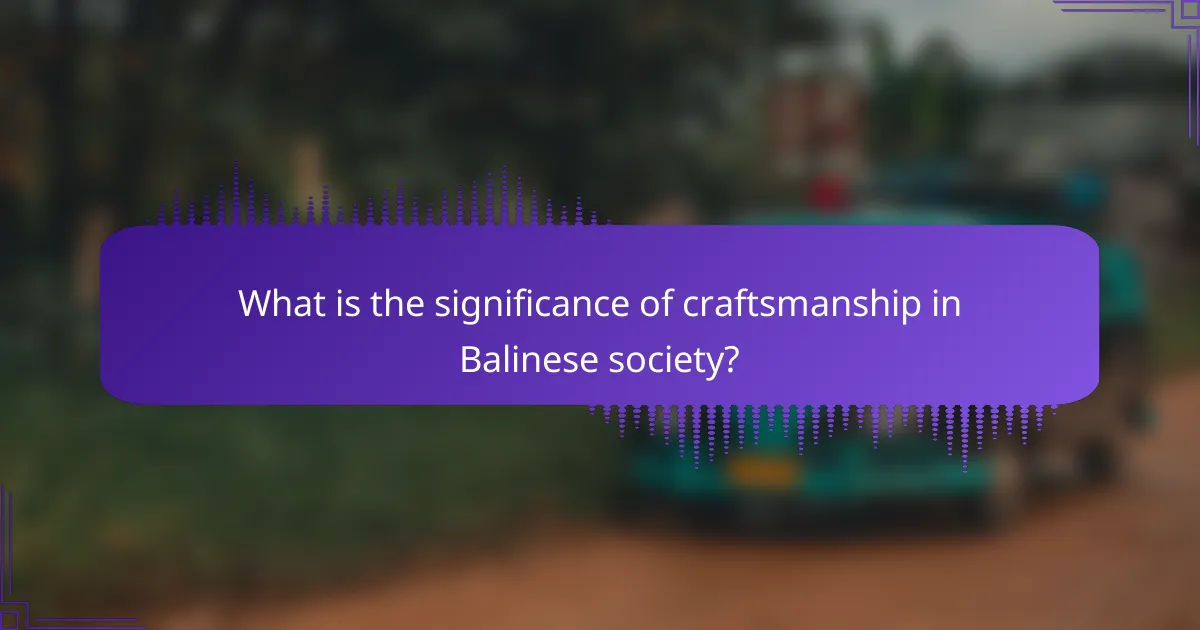
What is the significance of craftsmanship in Balinese society?
Craftsmanship holds immense significance in Balinese society, embodying cultural identity and heritage. Artisan workshops serve as vital spaces for preserving traditional skills and techniques, connecting generations through shared knowledge. The intricate craftsmanship reflects spiritual beliefs, with each piece often carrying symbolic meaning. Additionally, these workshops provide hands-on experiences, allowing visitors to engage deeply with Balinese culture.
How does craftsmanship contribute to local economies?
Craftsmanship significantly boosts local economies by creating jobs and attracting tourism. Artisan workshops in Bali exemplify this impact through their unique cultural offerings and hands-on experiences. These workshops provide employment opportunities for local artisans, fostering skill development and preserving traditional crafts. Additionally, they draw tourists eager to engage with authentic Balinese culture, leading to increased spending in the community. The unique attributes of these workshops, such as personalized craft experiences, enhance their appeal, contributing to sustainable economic growth in the region.
What role does craftsmanship play in cultural preservation?
Craftsmanship plays a vital role in cultural preservation by maintaining traditional skills and practices. In Bali, artisan workshops embody this connection through the creation of handmade goods that reflect local heritage. These workshops not only produce unique crafts but also serve as educational spaces, where artisans share their techniques with visitors. This hands-on experience fosters appreciation for Balinese culture and ensures that these traditions are passed down through generations. By engaging in craftsmanship, individuals contribute to the ongoing narrative of cultural identity and continuity in Bali.
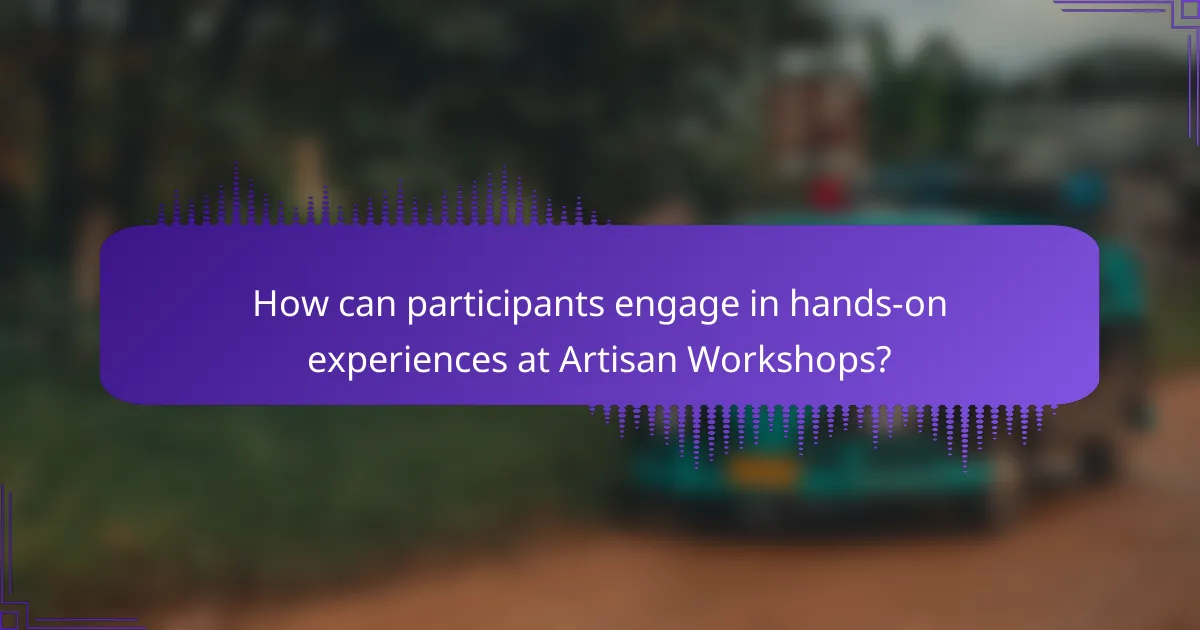
How can participants engage in hands-on experiences at Artisan Workshops?
Participants can engage in hands-on experiences at Artisan Workshops by actively participating in crafting sessions. These workshops offer immersive activities such as pottery, weaving, and painting, allowing individuals to learn traditional techniques directly from skilled artisans. The cultural significance of these workshops enhances the experience, as participants gain insight into local customs and craftsmanship. Engaging in these activities fosters a deeper appreciation for Bali’s rich artistic heritage.
What are the different formats of workshops available?
Artisan workshops in Bali are offered in various formats, each providing unique experiences. Common formats include hands-on crafting sessions, guided tours of artisan studios, immersive cultural experiences, and collaborative workshops with local artisans. These formats cater to different interests, allowing participants to engage deeply with Balinese craftsmanship and culture.
Which skills can participants learn through these workshops?
Participants can learn various skills through artisan workshops in Bali, including traditional craftsmanship techniques, cultural storytelling, and hands-on experience in specific art forms. These workshops often focus on skills such as woodworking, batik painting, pottery, and weaving. Participants gain practical knowledge and appreciation for Balinese culture, enhancing their artistic abilities and cultural understanding. Additionally, these experiences foster creativity and provide insights into sustainable practices used by local artisans.

What are the unique attributes of Artisan Workshops in Bali?
Artisan workshops in Bali are distinguished by their unique blend of traditional craftsmanship, cultural heritage, and immersive experiences. These workshops often feature handcrafted items, showcasing skills passed down through generations. The artisans use locally sourced materials, adding authenticity to their creations. Workshops provide hands-on opportunities for visitors, fostering a deep appreciation for Balinese culture. Each workshop may specialize in a particular craft, such as wood carving or textile weaving, highlighting the island’s diverse artistic expressions.
What distinguishes traditional workshops from contemporary ones?
Traditional workshops focus on preserving age-old techniques and cultural heritage, while contemporary workshops emphasize innovation and modern practices. Artisan workshops in Bali showcase intricate craftsmanship and cultural significance, often featuring hands-on experiences that connect participants to local traditions. Traditional workshops prioritize authenticity and skill mastery, whereas contemporary ones may incorporate technology and new materials. This distinction highlights the evolving nature of craftsmanship in Bali’s artisan scene.
How do specific workshops incorporate local materials?
Artisan workshops in Bali often incorporate local materials to enhance authenticity and cultural connection. These workshops utilize bamboo, clay, and natural dyes sourced from the island, fostering sustainability and traditional craftsmanship. For example, artisans craft intricate bamboo sculptures, reflecting Balinese heritage. This practice not only supports local economies but also preserves age-old techniques, making each piece unique. Participants gain hands-on experience, connecting with the local culture while creating meaningful art.

What are the rare attributes found in select Artisan Workshops?
Rare attributes found in select Artisan Workshops in Bali include unique crafting techniques, integration of local mythology in designs, use of rare materials, and personalized artisan experiences. These workshops often feature one-of-a-kind products that reflect the cultural heritage of Bali, such as hand-carved sculptures or traditional textile weaving. Additionally, some workshops offer limited-time classes that emphasize specific skills or artistic styles, providing an exclusive opportunity for participants.
What unique experiences do specific workshops offer?
Artisan workshops in Bali offer unique experiences through hands-on craftsmanship, cultural immersion, and personal storytelling. Participants engage directly with local artisans, learning traditional techniques such as batik, wood carving, and pottery. These workshops foster a deep connection to Balinese culture and heritage, enhancing appreciation for local artistry. Each workshop often includes a unique narrative from the artisan, sharing their personal journey and the significance of their craft.
How do some workshops integrate spiritual practices into their craft?
Some workshops in Bali integrate spiritual practices into their craft by emphasizing mindfulness and connection to nature. Artisans often incorporate meditation and rituals into the creative process, enhancing focus and intention. These practices foster a deeper appreciation for cultural heritage and promote a sense of community among participants. For instance, workshops may start with a guided meditation to center the mind before engaging in traditional crafts like batik or wood carving. This holistic approach enriches the overall experience, making it not just about skill but also about spiritual growth.
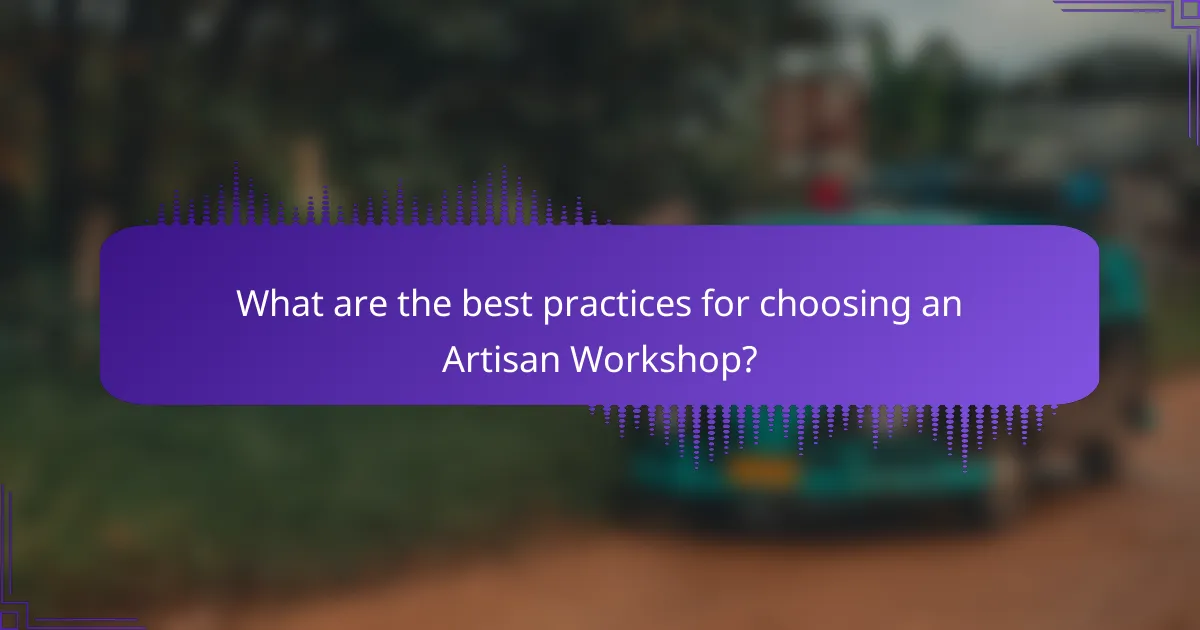
What are the best practices for choosing an Artisan Workshop?
To choose the best artisan workshop in Bali, consider the workshop’s reputation, craftsmanship quality, and cultural significance. Look for workshops that offer hands-on experiences, as this enhances learning and appreciation. Research reviews and testimonials to gauge previous participants’ satisfaction. Additionally, verify the authenticity of the materials used and the skills of the artisans involved. Engaging with local artisans directly can provide unique insights into their practices and heritage, enriching your experience.
What should participants consider before booking a workshop?
Participants should consider their interests, skill levels, and cultural openness before booking artisan workshops in Bali. Understanding the workshop’s focus, whether on craftsmanship or cultural significance, helps align expectations. Researching the instructor’s expertise ensures a valuable learning experience. Additionally, considering the duration and materials provided can enhance preparation. Finally, participants should reflect on their commitment to hands-on experiences, as these workshops often require active engagement.
How can participants maximize their learning experience?
Participants can maximize their learning experience by actively engaging with instructors and peers. Embrace hands-on activities to enhance skills and understanding. Explore local culture through discussions and demonstrations, deepening the connection to craftsmanship. Set personal goals for each workshop to focus learning outcomes.
